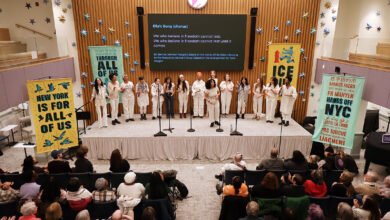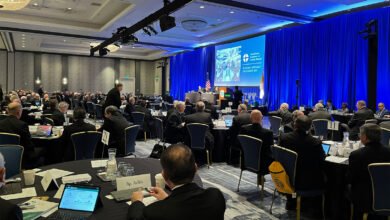(RNS) — Our broken immigration system is certainly a high priority for my family and me — just as it has become a pressing public issue in an election year when legislators seem determined to further politicize the conversation. The current debate? Inserting permanent policy changes into the Department of Homeland Security’s annual spending legislation, one of a handful of bills that need to pass to avoid a government shutdown.
The U.N. High Commissioner for Refugees estimates that 130 million people will be forcibly displaced or stateless in 2024, an increase only expected to grow with renewed conflict across the globe. We will never modernize and meet the country’s migration management needs if policy solutions are couched in provisions like the failed bipartisan Senate Emergency National Security Supplemental Act of 2024. The bill would have, based on arbitrary benchmarks, closed the door on individuals and families seeking refuge.
Migration is a necessity, and deterrence laws will never dissuade the movement of people as they seek peace, prosperity and security. I believe that our system, if properly funded and supported by smart, humane policies, could help solve those challenges migrants face today.
But even as calls for border wall funding continue in Congress’ current spending debates, I know we have had it easy.
Unlike millions of asylum-seekers, my family never had to flee for safety, risk our lives crossing deserts, suffer abuse at the hands of traffickers and authorities or be separated from each other. Neither have we tried to start a new life without the right to work or a place to live.
I am cognizant that my family did not have to endure the hardships that millions of people, including peacebuilders, experienced when they were forced to flee their homes as violence overran their communities and they, themselves, became targets. My family has hosted several such migrants, and their gut-wrenching stories gave me a deeper insight into forced migration.
Even so, as the mother of two Mexican American teenagers, migration policy matters personally. Unfortunately, it has become a highly divisive issue — and a leading election topic — where the people most affected are the least consulted by those in power in Washington.
For me and my fellow Quaker leaders, migration is, at its core, an issue of justice that is grounded in our faith. Members of the Religious Society of Friends (Quakers) came to the U.S. from England in the 17th century to escape religious persecution. In 2020, heads of Quaker organizations wrote in a joint statement: “All those fleeing conflict and persecution, including human trafficking survivors and other vulnerable populations, deserve the opportunity to pursue safe, productive, and fruitful lives. Strengthening our legal asylum processes and refugee resettlement program is essential to ensure proper protection.” Our policymakers fall short on this issue.
During the 2016 presidential elections, I tried to shield my two young boys from the anti-immigrant, anti-Mexican rhetoric that swirled all around us. I cried when my 4-year-old asked if we would not be able to visit “los abuelos” because of “the big wall” they were building.
Sadly, current immigration debates focus more on whether one party or another should be credited for solving the problem this election year. They are not centered on the experience of migrants — like my children and my fellow seekers of peace — who need to be assured of their basic human rights and dignity.
Sincere bipartisan negotiations and solutions on immigration law are overdue. Congress should strip immigration of the politics that has entangled it and focus on the lives of the people at risk.
Several common-sense reforms are possible. Train and hire more asylum officers to reduce screening delays. Allow asylum-seekers to work for themselves and their families by providing work permits within one month after their cases are filed. Fully fund humane migration management policies like the Shelter and Services Program. Who could take issue with that?
Finally, the government must strategically address the root causes of migration, including rising authoritarianism and violence, climate change and massive economic inequality.

Bridget Moix. (Photo courtesy FCNL)
As Quakers, we have a responsibility to advocate for the rights of other migrants, refugees and asylum-seekers. It is part of our own history and an expression of our belief in the divine dignity — or that of God — in every person.
(Bridget Moix is general secretary of the Friends Committee on National Legislation and its associated Quaker hospitality center, Friends Place on Capitol Hill. The views expressed in this commentary do not necessarily reflect those of Religion News Service.)
Source link



